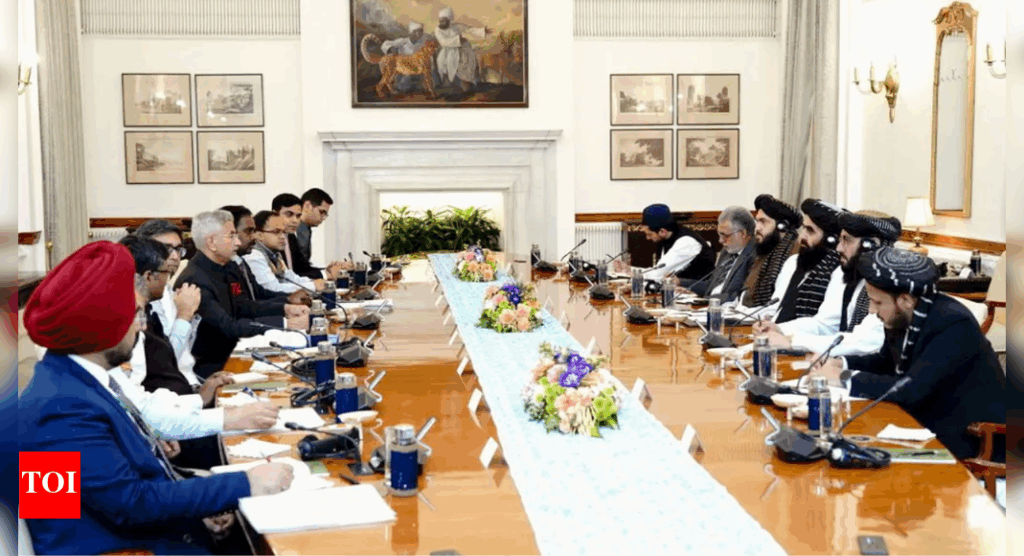
India is set to upgrade its technical mission in Kabul to a full-fledged embassy, marking a significant step in its diplomatic relations with Afghanistan under the Taliban regime. This move follows a landmark visit by Taliban Foreign Minister Amir Khan Muttaqi to New Delhi, where both nations announced new development projects and humanitarian aid initiatives aimed at fostering stronger ties.
The announcement comes as India reaffirms its commitment to Afghanistan’s sovereignty and stability, emphasizing the importance of regional peace. During the meeting, External Affairs Minister S. Jaishankar underscored the necessity of combating cross-border terrorism, a concern shared by both nations. In a joint statement, India and Afghanistan condemned acts of terrorism originating from regional countries, implicitly referring to Pakistan.
Historical Context and Diplomatic Shifts
India’s decision to reopen its embassy in Kabul marks a pivotal moment in its diplomatic strategy towards Afghanistan. The embassy was initially closed following the Taliban’s return to power in August 2021. However, in June 2022, India deployed a technical team to oversee the distribution of humanitarian aid, signaling a cautious re-engagement with the Afghan government.
Historically, India has maintained a development partnership with Afghanistan, contributing over 500 projects across all 34 provinces. This longstanding relationship is now poised for renewal, with India announcing the launch of six new projects aimed at infrastructure development and capacity-building.
Economic and Humanitarian Initiatives
During the visit, Muttaqi extended an invitation to Indian companies to invest in Afghanistan’s mining sector, highlighting opportunities for strengthening bilateral trade. India, in response, expressed its willingness to assist in reconstructing residential buildings in earthquake-affected areas, demonstrating a commitment to humanitarian aid.
India also addressed the plight of forcibly repatriated Afghan refugees, emphasizing the importance of their dignity and livelihood. Plans to construct residences for these refugees and continue providing material aid were discussed, further solidifying India’s role as a supportive neighbor.
Healthcare and Education Support
In a bid to enhance Afghanistan’s healthcare system, India announced the donation of 20 ambulances, MRI and CT scan machines, and vaccines for immunization and cancer treatment. Additionally, a thalassemia center and five maternity health clinics are set to be established, reflecting India’s commitment to improving public health infrastructure.
Education also featured prominently in the discussions, with Jaishankar pledging to expand opportunities for Afghan students to study in India. This includes more visas for medical, business, and student categories, fostering cultural and educational exchanges between the two nations.
Security Concerns and Regional Implications
The meeting between Jaishankar and Muttaqi also addressed security concerns, particularly the threat of cross-border terrorism. Jaishankar highlighted the shared threat faced by both nations, stating,
“We have a common commitment towards growth and prosperity. However, these are endangered by the shared threat of cross-border terrorism that both our nations face.”
India’s focus on regional stability is underscored by its efforts to promote peace and mutual trust, especially in light of the Taliban’s strained relations with Pakistan over the activities of the Tehreek-e-Taliban.
Future Prospects and Diplomatic Engagement
The reopening of the Indian embassy in Kabul is a significant diplomatic gesture, albeit not a formal recognition of the Taliban regime. It represents a strategic move to deepen economic cooperation and remove barriers to further engagement.
Looking ahead, India’s engagement with Afghanistan is likely to focus on development and humanitarian efforts, with an emphasis on fostering regional stability. The continuation of dialogue and cooperation between the two nations will be crucial in addressing shared challenges and advancing mutual interests.
As India reestablishes its diplomatic presence in Kabul, the world will be watching closely to see how this renewed relationship unfolds, particularly in the context of broader geopolitical dynamics in South Asia.






